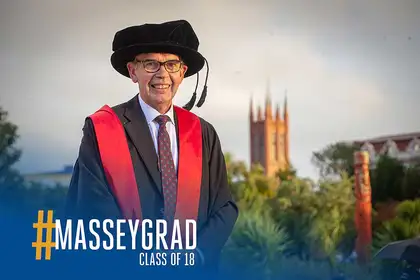
Dr Dennis Slade from the School of Sport, Exercise and Nutrition graduated with his PhD this week in Palmerston North.
Managing players’ pleas to get on with the game instead of lining up to practise skills is a predicament at the heart of sports teaching and coaching – and the topic of new research from Massey University.
In New Zealand, traditional skill-based game teaching models in physical education and sports coaching have gradually been supplemented by the Game Centred Learning (GCL) model. Although elements of GCL had been employed for at least forty years, no detailed research existed on how, when and why they developed in New Zealand.
Dr Dennis Slade’s PhD thesis, entitled “Please Sir, Can We Play a Game?” Transforming Games Teaching and Coaching: A Practitioner’s Perspective, examines this phenomenon in New Zealand between 1945 and 2015. His research establishes that GLC was not mandated by educational policy. Rather, development and dissemination of GCL evolved through various combinations of insights from early luminaries in the field, a new guard of physical educators in pre-service teacher education colleges, and a new socio-ecological perspective in PE syllabi in 1999 and 2007.
“The plea from the learners, ‘Can we play a game?’ is a call many teachers and coaches of games and sports will have heard time and again,” Dr Slade says. “The desire is to play the game, not spend practice time waiting for their turn to perform a skill in a context completely isolated from the game they signed up for or were told they were going to play.
“Transforming the teaching and coaching of games has occurred through that plea being heard and practitioners and academics wrestling with how to provide game-learning opportunities for both novice and elite players. The result has been models of game-learning based on constructivist theories of learning and a catch-all phrase now embraced in teaching and coaching throughout the world, namely, game-centred learning.”
Dr Slade’s transformation in game-teaching and coaching first occurred when he was still a trainee teacher – albeit without any conscious awareness. “After many years of teaching, coaching, researching games teaching, writing journal articles, publishing three books on the topic and conducting numerous workshops in various parts of the world, this thesis presented me with two opportunities. One was to discover how this transformation in games-teaching occurred in New Zealand and secondly, to present a model of GCL that would allow all teachers and coaches, regardless of experience, to employ GCL strategies,” he says.
Dr Slade’s findings demonstrate that the transformation in game-teaching was never a centrally-mandated educational policy but was practitioner-driven. The development of his model for interpreting GCL has provided an entry into teaching games through a GCL structure that is accessible to all teachers and coaches, regardless of their previous background or experience. In doing so, it overcame a teacher-practitioner frustration that suggested GCL strategies were too complex for beginning teachers and coaches.
“The application of the model has been recognised as having the potential for teachers or coaches to avoid being the recipient of the frustrated lament of their students, so often heard in the school gymnasium: ‘Please Sir, can we have a game?’”
Formerly from Gisborne, Dr Slade has played international-level sport, most recently in the Masters Hockey World Cup where he was the competition’s top goal scorer. His wife Philippa was a national and provincial swimming champion and his three children all achieved honours in national level sport. Philippa, their eldest son Andrew and daughter Caroline are also Massey alumni and youngest son Richard is currently undertaking doctoral studies in international law in Australia. Dr Slade came to Massey following the merger between Massey and the former Palmerston North College of Education. He is a senior lecturer in the School of Sport, Exercise and Nutrition in the College of Health.